- Home
- William Shakespeare
Complete Plays, The Page 14
Complete Plays, The Read online
Page 14
Nurse
This afternoon, sir? well, she shall be there.
Romeo
And stay, good nurse, behind the abbey wall:
Within this hour my man shall be with thee
And bring thee cords made like a tackled stair;
Which to the high top-gallant of my joy
Must be my convoy in the secret night.
Farewell; be trusty, and I’ll quit thy pains:
Farewell; commend me to thy mistress.
Nurse
Now God in heaven bless thee! Hark you, sir.
Romeo
What say’st thou, my dear nurse?
Nurse
Is your man secret? Did you ne’er hear say,
Two may keep counsel, putting one away?
Romeo
I warrant thee, my man’s as true as steel.
Nurse
Well, sir; my mistress is the sweetest lady — Lord, Lord! when ’twas a little prating thing:— O, there is a nobleman in town, one Paris, that would fain lay knife aboard; but she, good soul, had as lief see a toad, a very toad, as see him. I anger her sometimes and tell her that Paris is the properer man; but, I’ll warrant you, when I say so, she looks as pale as any clout in the versal world. Doth not rosemary and Romeo begin both with a letter?
Romeo
Ay, nurse; what of that? both with an R.
Nurse
Ah. mocker! that’s the dog’s name; R is for the — No; I know it begins with some other letter:— and she hath the prettiest sententious of it, of you and rosemary, that it would do you good to hear it.
Romeo
Commend me to thy lady.
Nurse
Ay, a thousand times.
Exit Romeo
Peter!
Peter
Anon!
Nurse
Peter, take my fan, and go before and apace.
Exeunt
SCENE V. CAPULET’S ORCHARD.
Enter Juliet
Juliet
The clock struck nine when I did send the nurse;
In half an hour she promised to return.
Perchance she cannot meet him: that’s not so.
O, she is lame! love’s heralds should be thoughts,
Which ten times faster glide than the sun’s beams,
Driving back shadows over louring hills:
Therefore do nimble-pinion’d doves draw love,
And therefore hath the wind-swift Cupid wings.
Now is the sun upon the highmost hill
Of this day’s journey, and from nine till twelve
Is three long hours, yet she is not come.
Had she affections and warm youthful blood,
She would be as swift in motion as a ball;
My words would bandy her to my sweet love,
And his to me:
But old folks, many feign as they were dead;
Unwieldy, slow, heavy and pale as lead.
O God, she comes!
Enter Nurse and Peter
O honey nurse, what news?
Hast thou met with him? Send thy man away.
Nurse
Peter, stay at the gate.
Exit Peter
Juliet
Now, good sweet nurse,— O Lord, why look’st thou sad?
Though news be sad, yet tell them merrily;
If good, thou shamest the music of sweet news
By playing it to me with so sour a face.
Nurse
I am a-weary, give me leave awhile:
Fie, how my bones ache! what a jaunt have I had!
Juliet
I would thou hadst my bones, and I thy news:
Nay, come, I pray thee, speak; good, good nurse, speak.
Nurse
Jesu, what haste? can you not stay awhile?
Do you not see that I am out of breath?
Juliet
How art thou out of breath, when thou hast breath
To say to me that thou art out of breath?
The excuse that thou dost make in this delay
Is longer than the tale thou dost excuse.
Is thy news good, or bad? answer to that;
Say either, and I’ll stay the circumstance:
Let me be satisfied, is’t good or bad?
Nurse
Well, you have made a simple choice; you know not how to choose a man: Romeo! no, not he; though his face be better than any man’s, yet his leg excels all men’s; and for a hand, and a foot, and a body, though they be not to be talked on, yet they are past compare: he is not the flower of courtesy, but, I’ll warrant him, as gentle as a lamb. Go thy ways, wench; serve God. What, have you dined at home?
Juliet
No, no: but all this did I know before.
What says he of our marriage? what of that?
Nurse
Lord, how my head aches! what a head have I!
It beats as it would fall in twenty pieces.
My back o’ t’ other side,— O, my back, my back!
Beshrew your heart for sending me about,
To catch my death with jaunting up and down!
Juliet
I’ faith, I am sorry that thou art not well.
Sweet, sweet, sweet nurse, tell me, what says my love?
Nurse
Your love says, like an honest gentleman, and a courteous, and a kind, and a handsome, and, I warrant, a virtuous,— Where is your mother?
Juliet
Where is my mother! why, she is within;
Where should she be? How oddly thou repliest!
‘Your love says, like an honest gentleman,
Where is your mother?’
Nurse
O God’s lady dear!
Are you so hot? marry, come up, I trow;
Is this the poultice for my aching bones?
Henceforward do your messages yourself.
Juliet
Here’s such a coil! come, what says Romeo?
Nurse
Have you got leave to go to shrift to-day?
Juliet
I have.
Nurse
Then hie you hence to Friar Laurence’ cell;
There stays a husband to make you a wife:
Now comes the wanton blood up in your cheeks,
They’ll be in scarlet straight at any news.
Hie you to church; I must another way,
To fetch a ladder, by the which your love
Must climb a bird’s nest soon when it is dark:
I am the drudge and toil in your delight,
But you shall bear the burden soon at night.
Go; I’ll to dinner: hie you to the cell.
Juliet
Hie to high fortune! Honest nurse, farewell.
Exeunt
SCENE VI. FRIAR LAURENCE’S CELL.
Enter Friar Laurence and Romeo
Friar Laurence
So smile the heavens upon this holy act,
That after hours with sorrow chide us not!
Romeo
Amen, amen! but come what sorrow can,
It cannot countervail the exchange of joy
That one short minute gives me in her sight:
Do thou but close our hands with holy words,
Then love-devouring death do what he dare;
It is enough I may but call her mine.
Friar Laurence
These violent delights have violent ends
And in their triumph die, like fire and powder,
Which as they kiss consume: the sweetest honey
Is loathsome in his own deliciousness
And in the taste confounds the appetite:
Therefore love moderately; long love doth so;
Too swift arrives as tardy as too slow.
Enter Juliet
Here comes the lady: O, so light a foot
Will ne’er wear out the everlasting flint:
A lover may bestride the gossamer
That idles in the wanton sum
mer air,
And yet not fall; so light is vanity.
Juliet
Good even to my ghostly confessor.
Friar Laurence
Romeo shall thank thee, daughter, for us both.
Juliet
As much to him, else is his thanks too much.
Romeo
Ah, Juliet, if the measure of thy joy
Be heap’d like mine and that thy skill be more
To blazon it, then sweeten with thy breath
This neighbour air, and let rich music’s tongue
Unfold the imagined happiness that both
Receive in either by this dear encounter.
Juliet
Conceit, more rich in matter than in words,
Brags of his substance, not of ornament:
They are but beggars that can count their worth;
But my true love is grown to such excess
I cannot sum up sum of half my wealth.
Friar Laurence
Come, come with me, and we will make short work;
For, by your leaves, you shall not stay alone
Till holy church incorporate two in one.
Exeunt
ACT III
SCENE I. A PUBLIC PLACE.
Enter Mercutio, Benvolio, Page, and Servants
Benvolio
I pray thee, good Mercutio, let’s retire:
The day is hot, the Capulets abroad,
And, if we meet, we shall not scape a brawl;
For now, these hot days, is the mad blood stirring.
Mercutio
Thou art like one of those fellows that when he enters the confines of a tavern claps me his sword upon the table and says ‘God send me no need of thee!’ and by the operation of the second cup draws it on the drawer, when indeed there is no need.
Benvolio
Am I like such a fellow?
Mercutio
Come, come, thou art as hot a Jack in thy mood as any in Italy, and as soon moved to be moody, and as soon moody to be moved.
Benvolio
And what to?
Mercutio
Nay, an there were two such, we should have none shortly, for one would kill the other. Thou! why, thou wilt quarrel with a man that hath a hair more, or a hair less, in his beard, than thou hast: thou wilt quarrel with a man for cracking nuts, having no other reason but because thou hast hazel eyes: what eye but such an eye would spy out such a quarrel? Thy head is as fun of quarrels as an egg is full of meat, and yet thy head hath been beaten as addle as an egg for quarrelling: thou hast quarrelled with a man for coughing in the street, because he hath wakened thy dog that hath lain asleep in the sun: didst thou not fall out with a tailor for wearing his new doublet before Easter? with another, for tying his new shoes with old riband? and yet thou wilt tutor me from quarrelling!
Benvolio
An I were so apt to quarrel as thou art, any man should buy the fee-simple of my life for an hour and a quarter.
Mercutio
The fee-simple! O simple!
Benvolio
By my head, here come the Capulets.
Mercutio
By my heel, I care not.
Enter Tybalt and others
Tybalt
Follow me close, for I will speak to them.
Gentlemen, good den: a word with one of you.
Mercutio
And but one word with one of us? couple it with something; make it a word and a blow.
Tybalt
You shall find me apt enough to that, sir, an you will give me occasion.
Mercutio
Could you not take some occasion without giving?
Tybalt
Mercutio, thou consort’st with Romeo,—
Mercutio
Consort! what, dost thou make us minstrels? an thou make minstrels of us, look to hear nothing but discords: here’s my fiddlestick; here’s that shall make you dance. ’Zounds, consort!
Benvolio
We talk here in the public haunt of men:
Either withdraw unto some private place,
And reason coldly of your grievances,
Or else depart; here all eyes gaze on us.
Mercutio
Men’s eyes were made to look, and let them gaze;
I will not budge for no man’s pleasure, I.
Enter Romeo
Tybalt
Well, peace be with you, sir: here comes my man.
Mercutio
But I’ll be hanged, sir, if he wear your livery:
Marry, go before to field, he’ll be your follower;
Your worship in that sense may call him ‘man.’
Tybalt
Romeo, the hate I bear thee can afford
No better term than this,— thou art a villain.
Romeo
Tybalt, the reason that I have to love thee
Doth much excuse the appertaining rage
To such a greeting: villain am I none;
Therefore farewell; I see thou know’st me not.
Tybalt
Boy, this shall not excuse the injuries
That thou hast done me; therefore turn and draw.
Romeo
I do protest, I never injured thee,
But love thee better than thou canst devise,
Till thou shalt know the reason of my love:
And so, good Capulet,— which name I tender
As dearly as my own,— be satisfied.
Mercutio
O calm, dishonourable, vile submission!
Alla stoccata carries it away.
Draws
Tybalt, you rat-catcher, will you walk?
Tybalt
What wouldst thou have with me?
Mercutio
Good king of cats, nothing but one of your nine lives; that I mean to make bold withal, and as you shall use me hereafter, drybeat the rest of the eight. Will you pluck your sword out of his pitcher by the ears? make haste, lest mine be about your ears ere it be out.
Tybalt
I am for you.
Drawing
Romeo
Gentle Mercutio, put thy rapier up.
Mercutio
Come, sir, your passado.
They fight
Romeo
Draw, Benvolio; beat down their weapons.
Gentlemen, for shame, forbear this outrage!
Tybalt, Mercutio, the prince expressly hath
Forbidden bandying in Verona streets:
Hold, Tybalt! good Mercutio!
Tybalt under Romeo’s arm stabs Mercutio, and flies with his followers
Mercutio
I am hurt.
A plague o’ both your houses! I am sped.
Is he gone, and hath nothing?
Benvolio
What, art thou hurt?
Mercutio
Ay, ay, a scratch, a scratch; marry, ’tis enough.
Where is my page? Go, villain, fetch a surgeon.
Exit Page
Romeo
Courage, man; the hurt cannot be much.
Mercutio
No, ’tis not so deep as a well, nor so wide as a church-door; but ’tis enough,’twill serve: ask for me to-morrow, and you shall find me a grave man. I am peppered, I warrant, for this world. A plague o’ both your houses! ’Zounds, a dog, a rat, a mouse, a cat, to scratch a man to death! a braggart, a rogue, a villain, that fights by the book of arithmetic! Why the devil came you between us? I was hurt under your arm.
Romeo
I thought all for the best.
Mercutio
Help me into some house, Benvolio,
Or I shall faint. A plague o’ both your houses!
They have made worms’ meat of me: I have it,
And soundly too: your houses!
Exeunt Mercutio and Benvolio
Romeo
This gentleman, the prince’s near ally,
My very friend, hath got his mortal hurt
In my behalf; my reputation stain
’d
With Tybalt’s slander,— Tybalt, that an hour
Hath been my kinsman! O sweet Juliet,
Thy beauty hath made me effeminate
And in my temper soften’d valour’s steel!
Re-enter Benvolio
Benvolio
O Romeo, Romeo, brave Mercutio’s dead!
That gallant spirit hath aspired the clouds,
Which too untimely here did scorn the earth.
Romeo
This day’s black fate on more days doth depend;
This but begins the woe, others must end.
Benvolio
Here comes the furious Tybalt back again.
Romeo
Alive, in triumph! and Mercutio slain!
Away to heaven, respective lenity,
And fire-eyed fury be my conduct now!
Re-enter Tybalt
Now, Tybalt, take the villain back again,
That late thou gavest me; for Mercutio’s soul
Is but a little way above our heads,
Staying for thine to keep him company:
Either thou, or I, or both, must go with him.
Tybalt
Thou, wretched boy, that didst consort him here,
Shalt with him hence.
Romeo
This shall determine that.
They fight; Tybalt falls
Benvolio
Romeo, away, be gone!
The citizens are up, and Tybalt slain.
Stand not amazed: the prince will doom thee death,
If thou art taken: hence, be gone, away!
Romeo
O, I am fortune’s fool!
Benvolio
Why dost thou stay?
Exit Romeo
Enter Citizens, & c
First Citizen
Which way ran he that kill’d Mercutio?
Tybalt, that murderer, which way ran he?
Benvolio
There lies that Tybalt.
First Citizen
Up, sir, go with me;
I charge thee in the princes name, obey.
Enter Prince, attended; Montague, Capulet, their Wives, and others
Prince
Where are the vile beginners of this fray?
Benvolio
O noble prince, I can discover all
The unlucky manage of this fatal brawl:
There lies the man, slain by young Romeo,
That slew thy kinsman, brave Mercutio.
Lady Capulet
Tybalt, my cousin! O my brother’s child!
O prince! O cousin! husband! O, the blood is spilt
O my dear kinsman! Prince, as thou art true,
For blood of ours, shed blood of Montague.
O cousin, cousin!
Prince
Benvolio, who began this bloody fray?
Benvolio
Tybalt, here slain, whom Romeo’s hand did slay;
Romeo that spoke him fair, bade him bethink

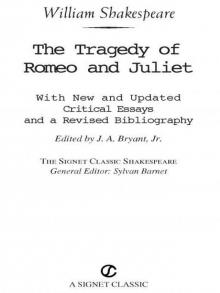 Romeo and Juliet
Romeo and Juliet As You Like It (Folger Shakespeare Library)
As You Like It (Folger Shakespeare Library)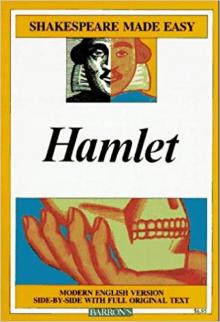 Hamlet
Hamlet Richard II (Folger Shakespeare Library)
Richard II (Folger Shakespeare Library) Macbeth
Macbeth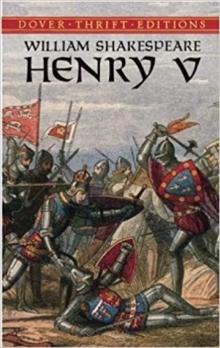 Henry V
Henry V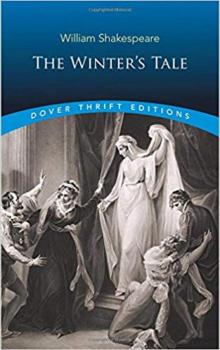 The Winter's Tale
The Winter's Tale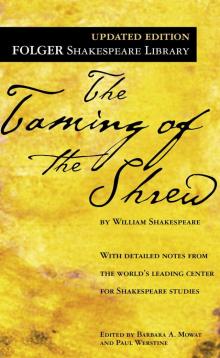 The Taming of the Shrew
The Taming of the Shrew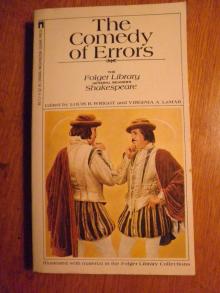 The Comedy of Errors
The Comedy of Errors King Lear (Folger Shakespeare Library)
King Lear (Folger Shakespeare Library)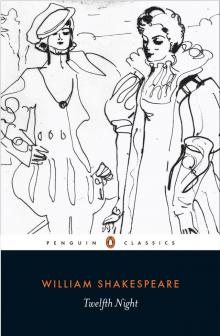 Twelfth Night
Twelfth Night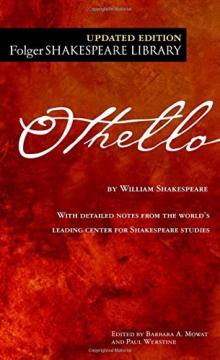 Othello
Othello The Two Gentlemen of Verona
The Two Gentlemen of Verona Henry IV, Part 1 (Folger Shakespeare Library)
Henry IV, Part 1 (Folger Shakespeare Library)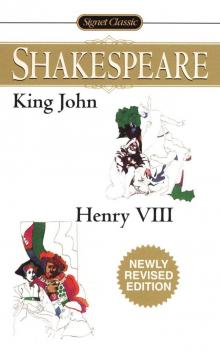 King John/Henry VIII (Signet Classics)
King John/Henry VIII (Signet Classics)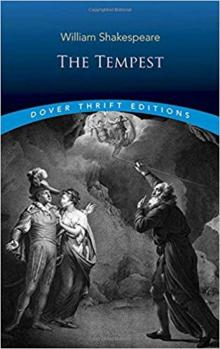 The Tempest
The Tempest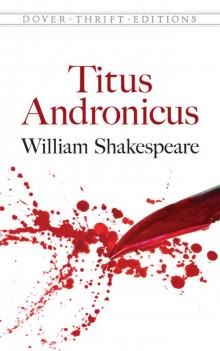 Titus Andronicus (Dover Publications)
Titus Andronicus (Dover Publications)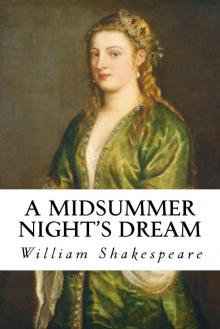 A Midsummer Night's Dream
A Midsummer Night's Dream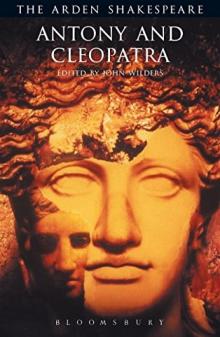 Antony and Cleopatra (Arden Shakespeare: Third Series)
Antony and Cleopatra (Arden Shakespeare: Third Series)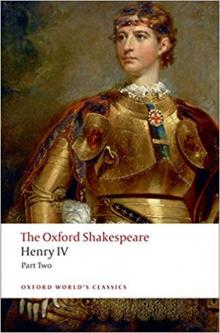 The Oxford Shakespeare: Henry IV, Part 2 (Oxford World's Classics)
The Oxford Shakespeare: Henry IV, Part 2 (Oxford World's Classics)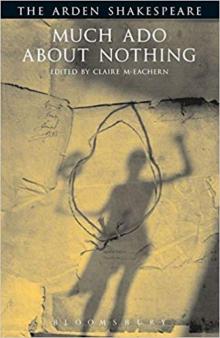 Much Ado About Nothing (Arden Shakespeare: Third Series)
Much Ado About Nothing (Arden Shakespeare: Third Series)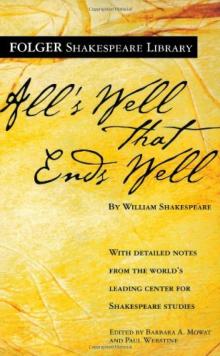 All's Well That Ends Well
All's Well That Ends Well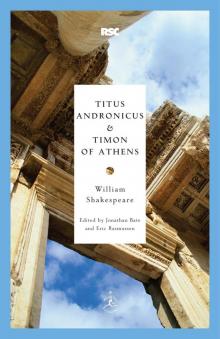 Titus Andronicus & Timon of Athens
Titus Andronicus & Timon of Athens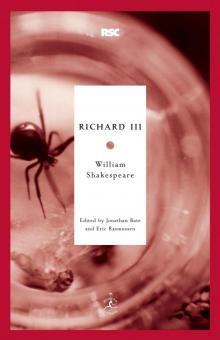 Richard III (Modern Library Classics)
Richard III (Modern Library Classics)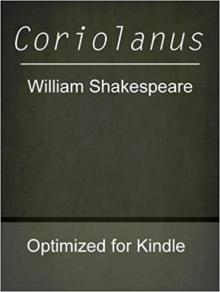 Coriolanus
Coriolanus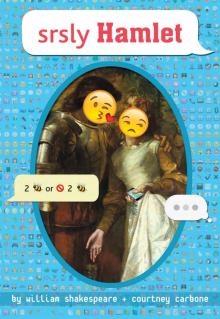 srsly Hamlet (OMG Shakespeare)
srsly Hamlet (OMG Shakespeare)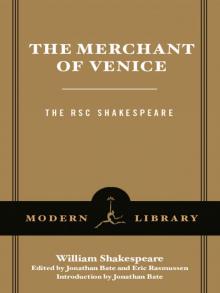 The Merchant of Venice
The Merchant of Venice Richard III
Richard III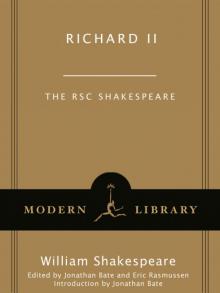 Richard II
Richard II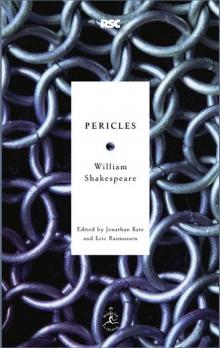 Pericles
Pericles As You Like It
As You Like It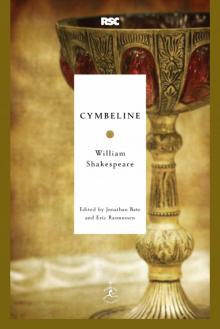 Cymbeline
Cymbeline Alls Wel that ends Well
Alls Wel that ends Well YOLO Juliet
YOLO Juliet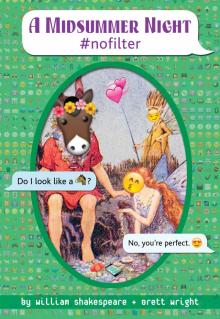 A Midsummer Night #nofilter
A Midsummer Night #nofilter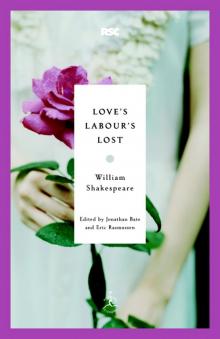 Love's Labour's Lost
Love's Labour's Lost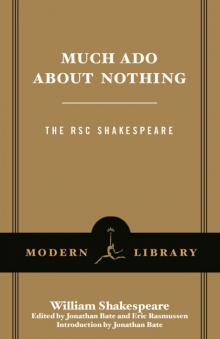 Much Ado About Nothing
Much Ado About Nothing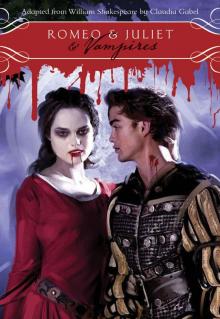 Romeo & Juliet & Vampires
Romeo & Juliet & Vampires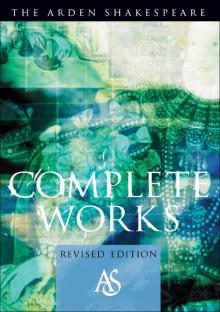 The Arden Shakespeare Complete Works
The Arden Shakespeare Complete Works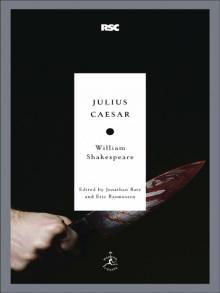 Julius Caesar
Julius Caesar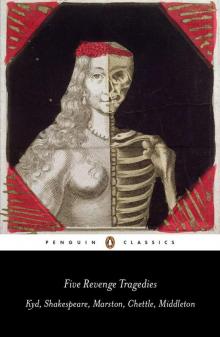 Five Revenge Tragedies: The Spanish Tragedy, Hamlet, Antonio's Revenge, The Tragedy of Hoffman, The Revenger's Tragedy (Penguin Classics)
Five Revenge Tragedies: The Spanish Tragedy, Hamlet, Antonio's Revenge, The Tragedy of Hoffman, The Revenger's Tragedy (Penguin Classics)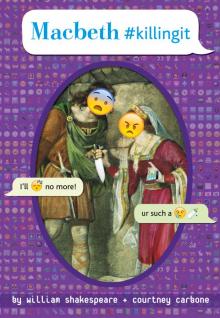 Macbeth #killingit
Macbeth #killingit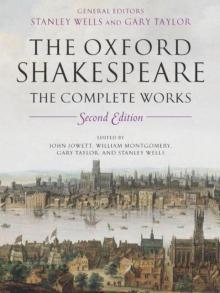 The Oxford Shakespeare: The Complete Works
The Oxford Shakespeare: The Complete Works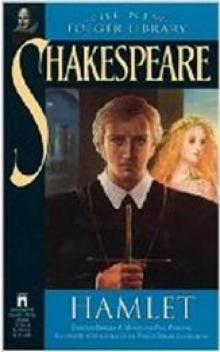 Hamlet, Prince of Denmark (Collins edition)
Hamlet, Prince of Denmark (Collins edition) King John & Henry VIII
King John & Henry VIII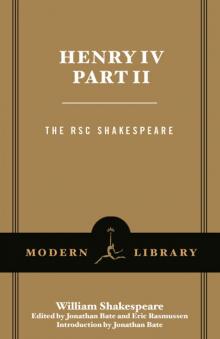 Henry IV, Part 2
Henry IV, Part 2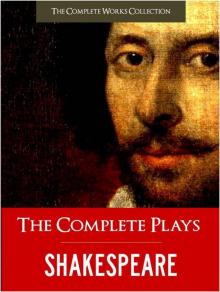 Complete Plays, The
Complete Plays, The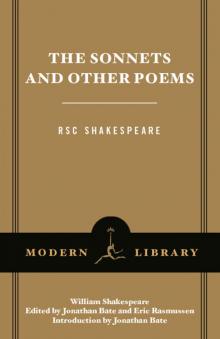 The Sonnets and Other Poems
The Sonnets and Other Poems Antony and Cleopatra
Antony and Cleopatra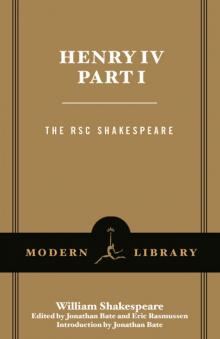 Henry IV, Part 1
Henry IV, Part 1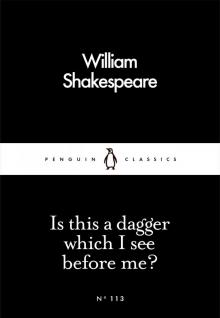 Is This a Dagger Which I See Before Me?
Is This a Dagger Which I See Before Me?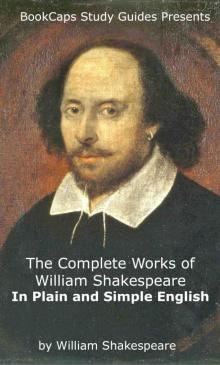 The Complete Works of William Shakespeare In Plain and Simple English (Translated)
The Complete Works of William Shakespeare In Plain and Simple English (Translated) The Sonnets
The Sonnets